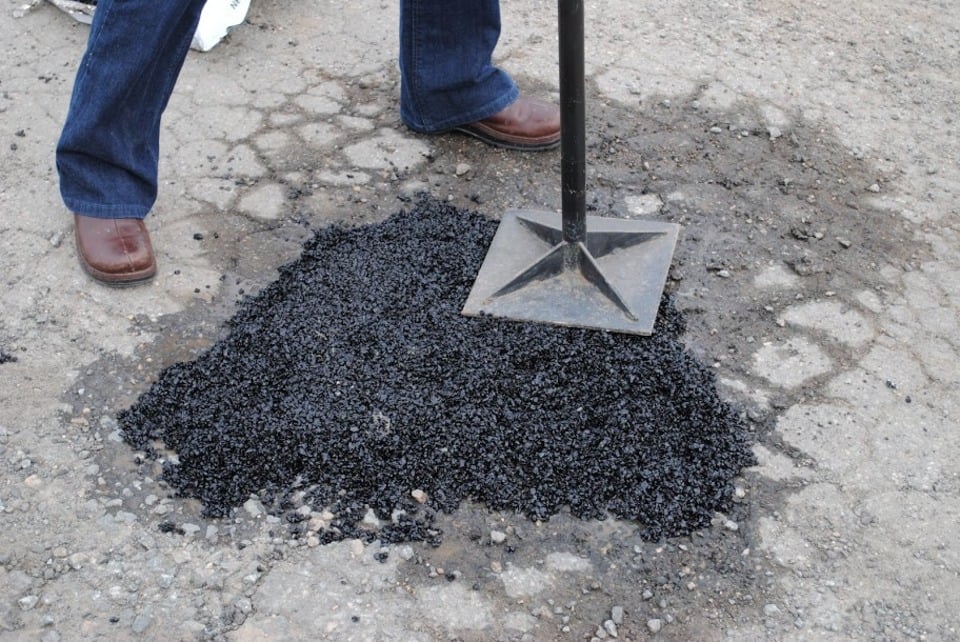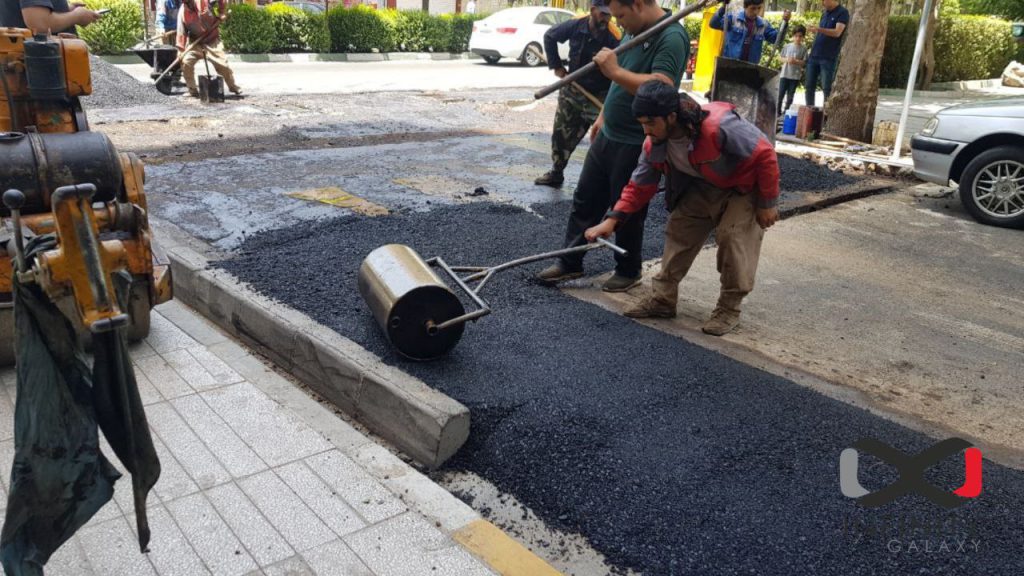Smooth, Smooth Surfaces: Asphalt Repair Techniques for Lasting Outcomes
Cold Mix Asphalt: Transforming the Way We Develop Roadways
As the framework industry proceeds to progress, the use of cold mix asphalt presents a promising change in roadway construction methods. Its versatility to various climate problems and lasting attributes have actually triggered passion in the building industry. The innovative residential properties of cold mix asphalt are challenging typical road-building techniques, leading the method for enhanced performance and durability. This transformative product is not just reshaping the building landscape but likewise elevating appealing questions concerning its lasting effect on infrastructure growth (Asphalt Repair).
Advantages of Cold Mix Asphalt
What advantages does cool mix asphalt offer over standard hot mix asphalt in roadway building tasks? Cold mix asphalt supplies a number of advantages that make it a preferred option in certain circumstances. One vital advantage is its ability to be used in all weather, unlike hot mix asphalt which needs specific temperature problems for blending and laying. This adaptability permits year-round building and construction, minimizing task timelines and prices related to weather delays.
Moreover, chilly mix asphalt can be stockpiled for future usage, giving ease and price financial savings for upkeep projects. Its ease of application, requiring no specific tools or home heating, makes it optimal for fast repair work and patching. In addition, cold mix asphalt is much more eco-friendly as it needs much less energy for manufacturing and gives off lower levels of greenhouse gases compared to warm mix asphalt. These benefits integrated make chilly mix asphalt a effective and functional selection for various roadway building and construction projects.

Ecological Benefits
Cold mix asphalt's environmental advantages add dramatically to its allure as a sustainable choice for roadway building and construction jobs. Among the essential ecological advantages of chilly mix asphalt is its lower carbon impact compared to warm mix asphalt. The manufacturing procedure of chilly mix asphalt calls for less energy considering that it can be produced and applied at lower temperature levels, reducing greenhouse gas discharges. Additionally, chilly mix asphalt is commonly used recycled products such as redeemed asphalt pavement (RAP) and recycled asphalt shingles (RAS), further lowering the demand for new raw products and drawing away waste from landfills.
Moreover, the use of cool mix asphalt can result in lowered power consumption during building and construction due to its capacity to be applied making use of standard equipment without the requirement for added heating procedures. This not just minimizes fuel consumption however also reduces air contamination and enhances air high quality in the bordering areas. By picking cool mix asphalt for road jobs, building companies can make a favorable effect on the environment while still guaranteeing sturdy and top quality roadway surface areas.
Versatility in Weather
In roadway building jobs, the adaptability of cool mix asphalt in numerous climate condition enhances its usefulness and effectiveness. Unlike hot mix asphalt, which requires high temperatures throughout mixing and setup, cool mix asphalt can be used in a broad range of weather. Asphalt Repair. This flexibility makes it a valuable option for roadway building in areas with severe temperatures or uncertain climate patterns
Cold mix asphalt continues to be convenient also great site in winter, allowing construction jobs to continue throughout winter season when warm mix asphalt might not be a practical choice. Its ability to establish and treat without the requirement for heats guarantees that roadway maintenance and repairs can be executed year-round, lessening interruptions to website traffic flow and lowering general project timelines.
In addition, cold mix asphalt's strength to wetness makes it suitable for locations vulnerable to frequent rainfall or high moisture. Its flexibility and resilience allow it to endure growth and tightening triggered by temperature level changes, adding to longer-lasting roads that need fewer fixings with time. On the whole, the flexibility of chilly mix asphalt in different climate condition makes it a trusted choice for sustainable and efficient roadway construction tasks.

Cost-Effectiveness and Sustainability
Taking into consideration the ecological and financial effects of roadway construction products, just More Info how does the cost-effectiveness and sustainability of cool mix asphalt compare to typical alternatives? Cold mix asphalt uses a compelling cost-efficient and sustainable solution for roadway construction. In terms of cost-effectiveness, chilly mix asphalt typically needs reduced manufacturing temperature levels, reducing power consumption and production expenses compared to hot mix asphalt. The capability to be accumulated for lengthy periods without setting likewise decreases waste and permits much easier maintenance and repairs, leading to overall cost financial savings. Additionally, the use of chilly mix asphalt can result in minimized transport costs because of its longer life span and the opportunity of being generated on-site.
From a sustainability perspective, cold mix asphalt provides a number of ecological benefits. Its reduced manufacturing temperatures result in minimized greenhouse gas discharges and energy consumption, straightening with efforts to mitigate climate change. The capability to reuse existing materials right into cold mix asphalt contributes to a round economic climate technique, reducing the need for virgin products and decreasing general environmental impact. In general, the cost-effectiveness and sustainability of cool mix asphalt make it an appealing choice to typical road construction products.
Effect on Roadway Longevity
Roadway durability considerably affects the long-lasting efficiency and upkeep needs of asphalt sidewalks. Cold mix asphalt, with its unique characteristics, has a notable impact on road sturdiness. One crucial element is the capacity of chilly mix asphalt to hold up against temperature changes without jeopardizing its architectural stability. This versatility assists the pavement to resist cracking and rutting caused by changing weather, causing a longer life span for the road.
Moreover, the cool mix asphalt's enhanced resistance to dampness damages plays a vital function in maintaining roadway longevity. Standard warm mix asphalt is a lot more vulnerable to moisture seepage, which can deteriorate the pavement framework gradually. On the other hand, chilly mix asphalt's composition permits it to better resist water infiltration, decreasing the likelihood of potholes and other types of wear and tear.
Verdict
Finally, cold mix asphalt supplies a wide variety of benefits for roadway construction, including ecological benefits, versatility in weather, cost-effectiveness, and boosted road resilience. Its capacity to be used year-round and its sustainable methods make it a transformative choice for producing roadways that are both eco friendly and long lasting. With its ingenious strategy and lasting outcomes, cool mix asphalt is transforming the means we build roadways for a more lasting future.
What benefits does cool mix asphalt offer over traditional warm mix asphalt in roadway building and construction tasks? In addition, cold mix asphalt is a lot more environmentally pleasant as it requires less energy for manufacturing and emits lower levels of greenhouse gases compared to warm mix asphalt. Asphalt Repair. Additionally, chilly mix asphalt is commonly made making use of recycled products such as reclaimed asphalt Homepage pavement (RAP) and recycled asphalt shingles (RAS), further decreasing the demand for new raw materials and diverting waste from garbage dumps
Unlike warm mix asphalt, which calls for high temperatures during mixing and setup, chilly mix asphalt can be used in a vast array of climate conditions. In terms of cost-effectiveness, chilly mix asphalt normally calls for lower manufacturing temperatures, decreasing energy consumption and production prices compared to hot mix asphalt.